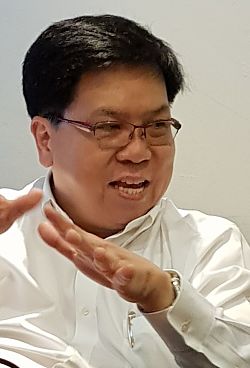 This article by Jennifer Tan (left, Director, Research & Products, Equities & Fixed Income, at the Singapore Exchange) was published in SGX's kopi-C: the Company brew series on 19 May 2017. The article is republished with permission.
This article by Jennifer Tan (left, Director, Research & Products, Equities & Fixed Income, at the Singapore Exchange) was published in SGX's kopi-C: the Company brew series on 19 May 2017. The article is republished with permission.
|
Growing up, one of Teo Cher Koon's most vivid memories was of a cargo ship's engine room, with its hot, sweaty atmosphere and the constant hum of machinery.
"Two friends started a company called Servo Dynamics in 1986, and after I graduated, they encouraged me to join them. After two years, I bought them out," he said. |
China's Economic Transition
Headquartered in Singapore, ISDN comprises 66 subsidiaries with sales offices spanning the region - China, Taiwan, Hong Kong, Malaysia, Vietnam, Thailand and Indonesia.
Over the last 30 years, the Group has evolved into a multinational, one-stop shop for engineering solutions. Its offerings include customised design and assembly of motion control systems - such as high-tech hinges, locks and fasteners, as well as precision gearboxes. These systems are typically used for factory automation in a broad range of industries, including semiconductor, mobile communications, telecommunications, data centres and railways.
|
"There's huge potential in North Asia, as China transitions from a labour-intensive economy to a high-tech one. The domestic economy may have slowed, but the next growth leap is definitely coming." - Teo Cher Koon ISDN Holdings |
ISDN also formulates and assembles various industrial computing hardware and software products to meet specialised customer needs.
"It was just a two-man show when we first started - me and a clerk.
"Today, we have nearly 850 employees, of which nearly half are sales and engineering staff, and our customers number more than 8,000," Teo said.
"In our first year, we chalked up S$200,000 to S$300,000 in revenue. By 2014, we had crossed the S$200 million mark."
By end of 2016, ISDN had achieved record revenue of S$258 million, and a net profit of S$10 million. The bottom line would have been S$13.2 million, if not for expenses incurred in its Hong Kong listing.
The Group's business focus remains predominantly in China, which accounted for 70% of group revenue in 2016. Hong Kong contributed 5.8%, while Malaysia and Singapore accounted for 2.4% and 14.3% respectively.
"There's huge potential in North Asia, as China transitions from a labour-intensive economy to a high-tech one. The domestic economy may have slowed, but the next growth leap is definitely coming," Teo said.
The operating landscape in this part of the world presents both challenges and opportunities, he noted. Competition has intensified as the range of solutions increases and more players enter the fray.
| ♦ Rise of the Machines | ||||||||||||
|
Meanwhile, the trend of automation in China's industrial sector continues to gather pace. The government's "Made in China 2025" plan, which promotes Industrial 4.0 concepts and robotic applications, has encouraged Chinese companies to move up the technology chain.
"The use of motion control technology in medical, energy and infrastructure sectors is increasing, while prospects in the smartphone segment remain robust - there's still a fairly long runway," Teo noted. |
||||||||||||
Harnessing Hydropower
In Indonesia, ISDN is focusing on hydropower. It has amassed a combined installed base capacity of 180 megawatts (MW) for its portfolio, with 130 MW located in North Sumatra, and more than 40 MW situated in Sulawesi.
The company has started constructing two mini hydropower plants in North Sumatra, and expects to begin building a third in North Sumatra, and a fourth in Sulawesi, by year-end. The biggest of these plants, with a capacity of 4.6 MW, will be commissioned in early 2018. The other three plants, each with a 10-MW capacity, will be ready by 2019.
Indonesia's hydropower potential is estimated at about 75,000 MW, with untapped resources concentrated on the islands of Sumatra, Java and Sulawesi, according to data from the International Hydropower Association.
Hydropower development will be driven in part by the government's target to raise the share of renewable energy production to 15% from 7% of generating capacity by 2025, data from market entry services firm Emerhub showed. The current installed capacity for all hydro plants is more than 4,000 MW, or just over 5% of the total hydro energy potential.
|
"Southeast Asia offers enormous potential, and is part of China's 'One Belt, One Road' strategy. Many Chinese state-owned enterprises are constantly looking for opportunities in this region, particularly in infrastructure projects." - Teo Cher Koon ISDN Holdings |
In February, to boost funding sources for its push into hydropower generation as well as strategic technology partnerships in its core motion control and engineering services division, ISDN took a 50% stake in corporate finance firm Emmett Capital Pte Ltd.
"This provides us with financing options for different stages of our business development efforts, and allows us to share resources with our partners, in particular, local SMEs that are hungry for capital to fund innovations and international expansion," Teo said.
Looking ahead, challenges abound, but worry is not a word in Teo's vocabulary. "There can be 1,001 things to worry about, at any moment of every day," he grinned.
"The marketplace is so dynamic, you don't know what's going to happen next. You can plan and invest, but things may not turn out as you expect. Our group is well-diversified - we don't have all our eggs in one basket, and this will cushion against any negative surprises."
Even when out of the office, the 58-year-old is constantly mulling prospects and strategies. "I spend a lot of time thinking about our next steps, and how to grow the organisation. Once we stop growing, that will be the beginning of our deterioration, and the end."
Values that resonate most with Teo, who has a daughter, 14, and a son, 18, include being true to yourself, doing your utmost and pushing your limits.
"Nowadays, one cannot afford to just do one thing in life - you need to be versatile, because the market is changing too quickly," he noted.
"We must continue to evolve with the market. We cannot stand still, or we will become obsolete."
Financial results
| Year ended 31 Dec (S$ '000) |
FY2016 | FY2015 | FY2014 | FY2013 |
| Revenue | 258,502 | 235,299 | 230,518 | 164,852 |
| Profit before tax | 14,331 | 17,213 | 15,237 | 9,201 |
| Profit attributable to equity holders | 5,153 | 8,721 | 7,457 | 4,754 |
| Quarter ended 31 March (S$ '000) | 1QFY2017 | 1QFY2016 | yoy chg |
| Revenue | 67,662 | 60,651 | 11.6% |
| Profit before tax | 3,688 | 2,727 | 35.2% |
| Profit attributable to equity holders | 1,721 | 653 | n.m. |
Source: Company data
| Outlook & Risks | ||
|
||
ISDN Holdings Ltd
Founded in 1987 as a precision and motion control engineering services provider, and listed on Singapore Exchange's Mainboard since 2005, ISDN has today transformed into a multi-industry corporation with diverse strengths. With more than 90 offices spanning key Asian growth markets, ISDN's business interests now include, in addition to engineering, the energy and agriculture sectors.
Dominant in the niche area of motion control and industrial computing, ISDN's customised solutions cater to different industrial sectors, including medical, robotics, factory automation, oil and gas, water treatment, manufacturing, and semiconductor industries. By leveraging on its alliances with strategic partners in Europe, Asia and Australia, ISDN is able to benefit from the best-in-class technology and business systems that these collaborations offer.
For its 1st quarter results for the period ended 31 March 2017, click here.
The company website is: www.isdnholdings.com.
The company's Stock Facts page is here.







